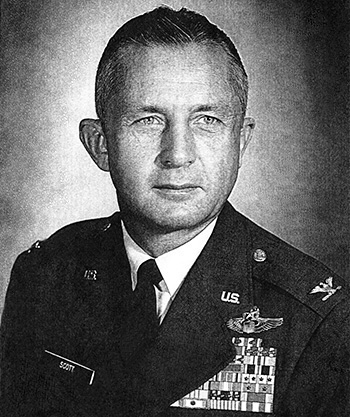
|
Robert R. Scott |
 |
|||
| Rank, Service | ||||
Colonel O-6, U.S. Air Force |
||||
| Veteran of: | ||||
|
||||
| Tribute: | ||||
Bob Scott was born on November 1, 1920, in Iowa. After completing two years of college at Iowa State University, he enlisted in the Aviation Cadet Program of the U.S. Army Air Forces on August 15, 1941, receiving his commission as a 2d Lt and his pilot wings on March 16, 1942. His first assignment was as an instructor pilot at Victorville Army Air Field, California, from March 1942 to January 1944, followed by service as a P-61 Black Widow night fighter pilot with the 426th Night Fighter Squadron in California, India, and then China from January 1944 to October 1945. During this time he was credited with the destruction of 2 enemy aircraft in aerial combat. Maj Scott served as an advisor to the Chinese Air Force after the war, and then served as an instructor with Air University at Maxwell AFB, Alabama, from September 1947 to August 1948. He received an Air Force Institute of Technology assignment to complete his bachelor's and then master's degree at Iowa State University from August 1948 to January 1951, and then served as a project officer in the All-Weather Fighter section with the 3200th Pilot Training Wing at Eglin AFB, Florida, from January to September 1951. After attending Test Pilot School at Edwards AFB, California, Maj Scott served as an F-86D Sabre project officer with Air Proving Ground Command at Eglin AFB from July 1952 to October 1952. He attended Fighter Bomber Escort Training at Nellis AFB, Nevada, from October 1952 to February 1953, and then served as an F-86 pilot with the 8th Fighter-Bomber Group in Korea from February to April 1953. Lt Col Scott next served as Commander of the 35th Fighter-Bomber Squadron in Korea from April to October 1953, followed by service as Executive Officer of the 8th Fighter-Bomber Group from October to December 1953. His next assignment was as an F-84 Thunderchief pilot and Commander of the 510th Fighter-Bomber Squadron at Langley AFB, Virginia, from December 1953 to June 1956, followed by service as an F-105 Thunderchief project officer at Edwards AFB, California, from June 1956 to April 1958. While serving as Commander of the 510th, he set a transcontinental speed record from Los Angeles to Mitchel Field on Long Island, New York, of 3 hours and 44 minutes on March 10, 1955. Col Scott served as Commander of the 335th Tactical Fighter Squadron at Eglin AFB from April 1958 to August 1960, and then as Chief of the Weapon Systems Branch in the Tactical Division with Headquarters U.S. Air Force in the Pentagon from August 1960 to June 1962. His next assignment was as a member of the Joint Chiefs of Staff Exercise Branch, Middle East Branch, and then European/Middle East Division in the Office of the Joint Chiefs of Staff in the Pentagon from June 1962 to July 1965, followed by service as Commander of the 6002nd Stan/Eval Group at Kadena AB, Okinawa, from July 1965 to August 1966. Col Scott served as Commander of the 355th Fighter Wing at Takhli Royal Thai AFB, Thailand, from August 1966 to August 1967, and during this time he was credited with the destruction of 1 enemy aircraft in aerial combat, making him one of only two pilots in history to score aerial victories in both World War II and the Vietnam War (the other was Brig Gen Robin Olds). His final assignment was as Commander of the 832nd Air Division at Cannon AFB, New Mexico, from September 1967 until his retirement from the Air Force on September 1, 1970. Bob Scott died on October 3, 2006, and was buried at Arlington National Cemetery. |
||||
|
||||

